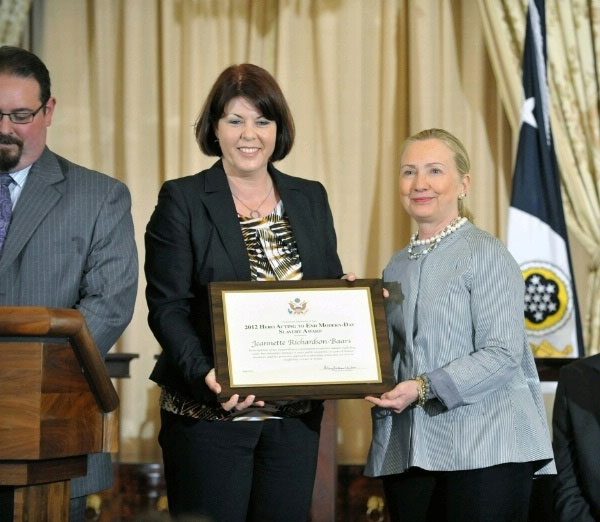 The Annual Trafficking in Persons (TIP) Report is the U.S. Government's principal diplomatic tool to engage foreign governments on human trafficking. It is also the world's most comprehensive resource on governmental anti-human trafficking efforts and reflects the U.S. Government's commitment to global leadership on this key human rights and law enforcement issue.
The Annual Trafficking in Persons (TIP) Report is the U.S. Government's principal diplomatic tool to engage foreign governments on human trafficking. It is also the world's most comprehensive resource on governmental anti-human trafficking efforts and reflects the U.S. Government's commitment to global leadership on this key human rights and law enforcement issue.Each year, the Department of State honors individuals around the world who have devoted their lives to the fight against human trafficking. These heroic individuals are NGO workers, lawmakers, police officers, and concerned citizens who are committed to ending modern slavery. They are recognized for their tireless efforts – despite resistance, opposition, and threats to their lives – to protect victims, punish offenders, and raise awareness of ongoing criminal practices in their countries and abroad.
Aruba's Head of the Division for Police Education & Development and National Coordinator Anti Human Trafficking & Smuggling, Jeannette Richardson-Baars was honored by U.S. Secretary of State Hillary Clinton for her extraordinary commitment to uncovering human trafficking cases, her innovative strategy to raise public awareness in spite of limited resources, and a proactive approach to providing protection services to victims in Aruba. "I was stunned and happily surprised when I heard from the U.S. Consul General in Curacao about this great honor. It really is an Aruba TIP Task Force team effort. I could not be regarded a hero without a great team," Mrs. Richardson-Baars said. Much credit also goes to the leadership of Prime Minster Eman, and Justice Minister Dowers for making it a priority to combat trafficking in persons.
Despite a full-time job as deputy police commissioner of Aruba, Jeannette Richardson-Baars devotes countless extra hours to ensure Aruba achieves results in combating human trafficking. Under Mrs. Richardson-Baars's leadership, Aruba's interagency committee has uncovered both labor and sex trafficking cases, and shown serious commitment and political will through effective governmental policies to rescue victims and prosecute traffickers.
Although she had no specific budget assigned to her, Mrs. Richardson-Baars did not allow limited financial or human resources to become obstacles to anti-trafficking efforts. Using her own computer, she launched a multi-faceted public awareness campaign that was translated into various languages and displayed posters prominently all over the island. The campaign resulted in reports by the public of several possible trafficking situations.
Mrs. Richardson-Baars sought creative solutions to help victims on the small island of Aruba, where anonymity is a challenge, by utilizing a Kingdom of the Netherlands-wide Memorandum of Understanding (MOU) to shelter victims of trafficking elsewhere. She takes a collaborative and transparent approach to her work, sharing best practices at international forums and speaking openly about challenges, including complicity of public servants. Her courage to address human trafficking in a frank and constructive way stands out among other tourism-based islands, where fear of reporting bad news may hamper a proactive approach to the issue.
The TIP report is available at http://www.state.gov/j/tip/rls/tiprpt/2012/index.htm.